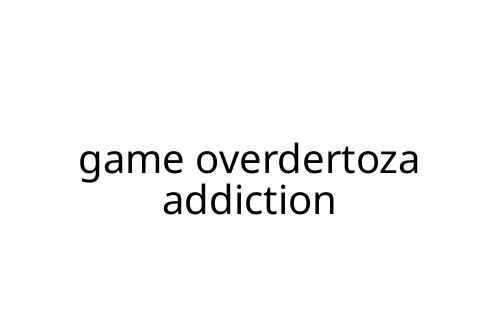game overdertoza addiction
Game overdertoza addiction is a term popping up more often these days, fueled by increased gaming habits and online discussions. It describes a situation where someone feels a strong, often uncontrollable urge to play Overdertoza—a multiplayer video game that's gained a cult following. For some, it’s just a pastime. For others, it can tip into a compulsive loop that's tough to break.
What Drives Game Overdertoza Addiction
At its core, game overdertoza addiction resembles other forms of behavioral addiction. Overdertoza is designed to keep players engaged. With frequent updates, social features, and an ever-expanding set of achievements, it's easy to lose track of time. There’s a steady hit of excitement—new in-game rewards, competition, and the drive to improve. These elements hook players in and can make stepping away feel almost impossible.
Many addicted players cite the game’s fast-paced action, teamwork, and the sense of belonging in the Overdertoza community as reasons they keep coming back. For those looking for stress relief, Overdertoza is a quick escape. The downside is, this escape can morph into avoidance—of work, studies, relationships, or even basic responsibilities.
Signs and Symptoms
Not everyone who plays Overdertoza regularly is addicted. Still, certain patterns are warning signs:
- Neglecting real-life obligations: Skipping work, homework, or social events to play
- Losing track of time: Sessions that stretch much longer than planned
- Mood changes: Irritability or anxiety when not playing
- Declining physical health: Fatigue, headaches, or irregular sleep
If these habits become routine, it’s time to take a step back and evaluate.
Pros and Cons of Playing Overdertoza
Like most games, there are upsides. Overdertoza can promote problem-solving, teamwork, and give players a place to decompress. It helps some people stay connected with friends and build social skills—especially in today’s digital world.
But the game’s design can be a double-edged sword. The rewards and social interaction can become addictive. Players may start prioritizing game achievements over real life ones, which can strain relationships and affect well-being.
Practical Tips for Managing Play
Dealing with game overdertoza addiction doesn’t always mean going cold turkey. Here are practical ways to keep things in check:
- Set clear play limits using timers or app settings
- Take frequent breaks and move around
- Balance gaming with other activities—sports, hobbies, time outdoors
- Stay honest: if gaming feels compulsory, talk with someone about it (family, friends, or a professional)
When to Seek Help
If Overdertoza is causing problems at work, school, or home, that’s more than just "liking a game." Professional help can make a difference. For some, talking to a counselor, joining online support forums, or reaching out to clinics specializing in behavioral addictions provides the structure and insight needed for recovery.
Final Thoughts
Game overdertoza addiction is real for some players, but it’s manageable. Moderation, open communication, and honest self-reflection are key. Gaming should be fun—not something that takes control of your life. Stay aware, put limits in place, and don’t hesitate to get help if you need it.

 Rudylier Alejandrosh, the visionary founder of Animal Potty Care, created the platform out of a deep passion for improving pet care solutions and enhancing the relationship between pets and their owners. With years of experience as a dedicated pet enthusiast, Rudylier recognized the challenges pet owners face in managing their pets' behavior, especially in areas like potty training and travel care. His commitment to making pet ownership easier and more enjoyable is reflected in the resources and guidance provided on the platform, which empowers pet owners with practical tips, innovative solutions, and a better understanding of their pets' needs.
Rudylier Alejandrosh, the visionary founder of Animal Potty Care, created the platform out of a deep passion for improving pet care solutions and enhancing the relationship between pets and their owners. With years of experience as a dedicated pet enthusiast, Rudylier recognized the challenges pet owners face in managing their pets' behavior, especially in areas like potty training and travel care. His commitment to making pet ownership easier and more enjoyable is reflected in the resources and guidance provided on the platform, which empowers pet owners with practical tips, innovative solutions, and a better understanding of their pets' needs.